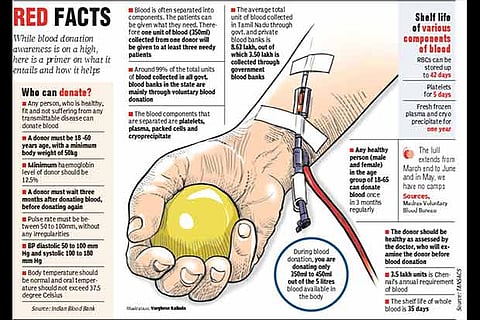

Chennai
With colleges in the city being closed for summer holidays following examinations, a large percentage of voluntary donation is affected during this period. With the government hospitals and other voluntary organisations going slow in organising blood donation camps, they are braced for a dip.
Not many camps during summer
PAKP Rajasekaran, who holds the distinction of donating blood for 191 times already, is also a regular organiser of blood donation camps in his locality. He says, “But in summer, it becomes extremely difficult to get donors for a camp. Though many youngsters still volunteer in summer, it is only a fraction of what we collect during other months.”
Similarly, the Madras Voluntary Blood Bureau, which organises camps all through the year, has no camps during the month of May. Says a source at the bureau, “The lull extends from March end to June and in May, we have no camps,” he says. Lions Blood Bank turns to community volunteering at the beaches and other public spaces to keep up steady donation rates. “Instead of 30 camps a month, during the summer we manage 15-20 camps, till the donation picks up after June,” says Sankaran D, PRO, Lions Blood Bank.
Government hospitals turn to camps
The dip is felt keenly in government hospitals that depend more on voluntary donation and on regular camps. Dr S Subash, Associate Professor, HOD, Government General Hospital Blood Bank, says there is a requirement of more than 200 units every day. The hospital also organises as many as 30-40 camps every month. “As many as 40-50 per cent of our donors are college students. Last summer, we managed to conduct 28 camps close to our monthly target of camps, despite the lack of volunteers,” he says.
Dr Subash adds that there is no alternative, except trying to mobilise volunteers to tide over the shortage. “We are finding some help among industries like the IT, but a lot depends on their policies. Some might arrange in the year end and it may not be suitable for us. However, we do get support from voluntary groups,” he says.
Huge requirement
Dr N Rajakumar, professor and HOD, transfusion medicine, Government Stanley Medical College, says that they are motivating organisers to maintain the number of camps at five per month. “We require 12,000 units per year for our hospital and conduct at least 66 camps a year to meet our requirements,” he says. Dr P Srinivasan, chairman, Co-Founder, Jeevan Stem Cell, says that while the constant shortage is a yearly occurrence, little has been done to meet the shortage. “There is a lot of dependency on the college camps, but we have we learnt over the years. A permanent solution in the state would be to establish a centre that can handle voluntary blood donors throughout the year, so that people can be recalled to donate blood once in six months, if not for once in three months. If we can coordinate a system like this, the problem of shortage or replacement donation will not exist,” he says. He also points to a model facility in South Africa that works like a call centre. He says, “It was a country once considered unsafe for blood transfusion because of HIV endemicity, almost 15 years ago. Today it is one of the safest places for blood transfusion. They have transformed it using a methodology like a call centre where the entire donor database is managed.”
Visit news.dtnext.in to explore our interactive epaper!
Download the DT Next app for more exciting features!
Click here for iOS
Click here for Android